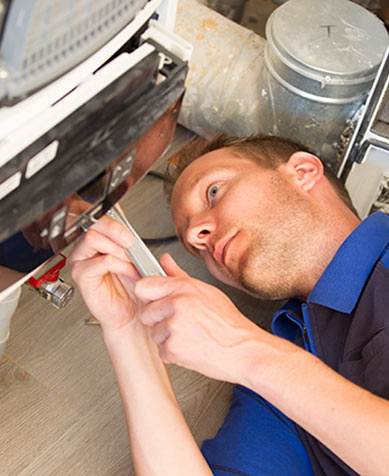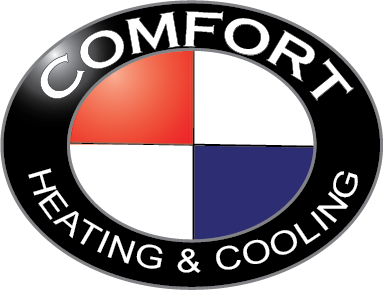How Is The Air Quality In Your Home Office?
2020 was quite a year in many ways, but those of us in the heating and cooling business were surprised by the newfound interest in HVAC technology. As we learned more about the virus and how it was airborne, many businesses +and families became interested in how their HVAC and ventilation systems could better filter the air. It makes sense. We should all be concerned with the quality of the indoor air we breathe. Let’s look at how to make sure the air in your home office is clean and fresh.

Elements of indoor air quality
Indoor air quality (IAQ) measures the quality of the air inside a building and how it affects the health and comfort of the occupants. Since people spent the majority of their time inside even before COVID-19, IAQ is even more important now. Common types of IAQ include volatile organic chemicals, radon, mold, and second-hand smoke. Symptoms of poor IAQ include headaches, fatigue, and irritation of the eyes, nose, or throat. People who are most sensitive include children, the elderly, and those with respiratory issues. Learn more about IAQ.
Does your HVAC system affect your office air quality?
The air that heats or cools your home will first pass through your HVAC system, where the air filter catches impurities like dust and dander in order to improve air quality and prevent damage to your HVAC system. There are different types of filters and each function slightly differently. An HVAC professional can tell you what kind of filter you’re currently using and make recommendations on what will work best for your system. Keep in mind: Using the wrong type of filter can damage your system. Some HVAC systems can’t handle the top-performing filters, like high-efficiency particulate air (HEPA) filters.
Elements of indoor air quality
Indoor air quality (IAQ) measures the quality of the air inside a building and how it affects the health and comfort of the occupants. Since people spent the majority of their time inside even before COVID-19, IAQ is even more important now. Common types of IAQ include volatile organic chemicals, radon, mold, and second-hand smoke. Symptoms of poor IAQ include headaches, fatigue, and irritation of the eyes, nose, or throat. People who are most sensitive include children, the elderly, and those with respiratory issues. Learn more about IAQ.
Do you suffer from headaches, fatigue, or eyes/nose/throat irritation?
These are symptoms of poor indoor air quality (IAQ), a measurement of volatile organic chemicals, radon, mold, and second-hand smoke.
The right HVAC air filters will improve indoor air quality.
The air that heats or cools your home will first pass through your HVAC system, where the air filter catches impurities like dust and dander in order to improve air quality and prevent damage to your HVAC system. There are different types of filters and each function slightly differently. An HVAC professional can tell you what kind of filter you’re currently using and make recommendations on what will work best for your system. Keep in mind: Using the wrong type of filter can damage your system. Some HVAC systems can’t handle the top-performing filters, like high-efficiency particulate air (HEPA) filters.
How does an HVAC system affect air quality?
The air that heats or cools your home will first pass through your HVAC system, where the air filter catches impurities like dust and dander in order to improve air quality and prevent damage to your HVAC system. There are different types of filters and each function slightly differently. An HVAC professional can tell you what kind of filter you’re currently using and make recommendations on what will work best for your system. Keep in mind: Using the wrong type of filter can damage your system. Some HVAC systems can’t handle the top-performing filters, like high-efficiency particulate air (HEPA) filters.
Pro Tip: Check with an HVAC professional before installing new filters — the wrong choice can damage your system.
Where are you working?
Many of us have continued to work from home during the pandemic, and we’ve adjusted our living spaces to better accommodate and optimize our new routines and schedules. For some, that has meant creating a work station where there wasn’t one previously, such as in a spare room, garage, or basement. These spaces don’t always have adequate HVAC systems to keep inhabitants comfortable while they work so it’s vital to manage and maintain air filters.
Air filters
Replacing the air filter on a regular basis is the best way to keep your HVAC system working efficiently, and can even lengthen the life of your system. When a filter is dirty, the system must work harder to do its job – move air from one area to another. Dirty filters also make it more likely that a blockage will occur, which can create an entire system malfunction (and a more costly repair). Energy efficiency is also negatively impacted by dirty filters. Luckily, replacing air filters is an easy task that homeowners can do themselves. Once you locate the filter, simply slide it out and replace with a new one.
If you want to enhance the comfort of your impromptu work area, consider installing a ductless mini split heat pump. These systems are incredibly efficient, affordable to install and operate, and provide customized temperatures with clean, filtered air.
Preventative maintenance
Regular HVAC maintenance is especially important for peak operation and air quality. If regular maintenance is skipped, then HVAC systems are more likely to break down, especially during extreme weather. An HVAC professional should perform annual checks of an HVAC system to ensure that everything is running smoothly and there are no signs of issues.
Air purifiers
Are you considering adding an air purifier to your HVAC system? This can be a great option to improve indoor air quality. One such product, the REME HALO™, addresses three types of indoor impurities: particulates, gases, and microbial substances. This system uses charged plasma to purify pollutants. Additionally, it can:
- Be fully integrated with existing HVAC systems;
- Reduce airborne particulates;
- Kill up to 99 percent of viruses, bacteria, and mold;
- Reduce home odors;
- Reduce 99 percent of sneeze germs (before the sneeze’s trajectory reaches three feet); and
- Kill 99 percent of viruses from surfaces.
Even better? A third-party study has found that the REME HALO™ inactivates COVID-19 by 99.9 percent. This is great news for families looking to reduce their risk of exposure, especially if vulnerable people live in the household.
Contact Comfort Heating & Cooling
If you want to improve your home’s IAQ, contact us today. We’ll run a detailed 20-point inspection of your system and make sure it’s running at peak performance. If you’d like an estimate for installing the REME HALO™, call us at 503-679-9276 or fill out our form.
Contact Us

Whether you’re remodeling, building a new home or simply replacing your existing heating system, you can depend on Comfort Heating and Cooling for reliable, efficient heating solutions that will last for years to come. Your new furnace will help you comfortably ride out the harshest winter while you increase the resale value of your home. We understand that no other single system in your home plays a larger role in your comfort or how much your utility bill will be. That’s why we specialize in high efficiency heating solutions that can warm your interior space in the most cost-effective way.
